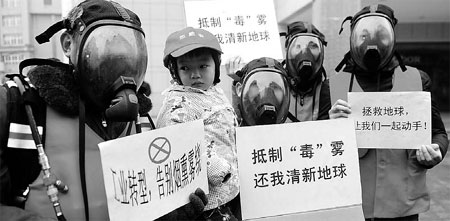Pollution hits Shanghai but should clear in a day
Updated: 2013-01-17 08:11
By Shi Yingying in Shanghai (China Daily)
|
||||||||
|
People wear gas masks and hold signs complaining about air pollution in Hefei, capital of Anhui province, on Wednesday. The performance art show aimed at making the public more aware of the need for environmental protection. Yu Junjie / for China Daily |
City's air quality index reaches 254, the highest reading in two months
Shanghai residents breathed the most polluted air they had seen in two months on Wednesday as weak cold air from the north brought pollutants to the Yangtze River Delta.
But clean air is expected on Thursday thanks to another round of cold air, forecasters said.
Seasonal factors played an important role as winter is the high pollution season, and straw burning in nearby provinces also contributed to the pollution, experts said.
Shanghai's air quality index, a new air quality reporting system that monitors sulfur dioxide, nitrogen dioxide, carbon monoxide, ozone, PM10 and PM2.5, reached 254 by 7 pm on Wednesday.
The figure, which indicated the air had reached the level of heavy pollution, was the highest seen since the index was introduced two months ago, according to the Shanghai Environmental Monitoring Center.
Shanghai's hourly density of PM2.5, air particles smaller than 2.5 microns, also reached 250 micrograms per cubic meter by 10 am, while the reading was only 60 micrograms per cubic meter early Tuesday morning.
The heavy pollution in the eastern metropolis followed thick air pollution in Beijing over the weekend. Beijing's density of PM2.5 broke the record since the municipality began publishing the data in early 2012 as its figure went higher than 900 micrograms per cubic meter in several districts of the city on Saturday.
Lin Chenyan, a forecaster with Shanghai Environmental Monitoring Center, said the cold front brought in airborne pollutants from the north.
"The cold snap is like a broom sweeping down all the way to Shanghai, and it brings the dust here," said Lin, adding that atmospheric motion sometimes causes trouble such as that.
Before arriving in Shanghai, the pollutants had left some of Shanghai's neighboring provinces shrouded in smog and fog.
Fifty out of the 72 monitoring stations in Jiangsu province reported medium to heavy pollution on Monday evening, according to Zhang Xiangzhi, deputy director of the Jiangsu Environmental Monitoring Center.
Yang Xin, a professor with Fudan University's department of environmental science and engineering who specializes in atmospheric particulates, said seasonal influences explain the record-breaking data in both Beijing and Shanghai.
"Take Shanghai as an example. It just celebrated its cleanest summer in 2012 - sea breeze from the southeast is helpful in diluting pollutants in the air. However, the monsoons coming from the northwest in the winter usually bring dirty air from the north," Yang said.
Agricultural straw burning in nearby areas also contributed to part of Shanghai's PM2.5 reading, according to Wang Lin, a researcher at Fudan University's Department of Environmental Science and Engineering.
"But it's hard for the Shanghai government to prohibit farmers in the neighboring regions from doing so," Wang said.
According to Lin, the forecaster, Shanghai's air was set to improve on Wednesday night and early Thursday morning. The next wave of cold air is much cleaner because of the clearing of air pollution in the north.
Control measures
Authorities from the Shanghai Environmental Protection Bureau said measures such as an emergency pollution-reduction plan have been applied to coal-fired power plants and other relevant chemical industries. Construction sites in Shanghai were also asked to take dust-control measures.
But an employee with Baosteel who wouldn't give a name told China Daily that no reduction measure had been applied because "the company already met the city's emission standards".
Meanwhile, Jiangsu province's environmental protection authority also drafted an emergency warning plan for air pollution.
The draft said when air quality index readings of more than half of the province's monitoring stations reached 201 to 300, outdoor activities of its primary school and middle school students would be suspended and students can take a vacation from school when the readings are more than 300.
Outdoor barbecues and fireworks and crackers will be banned in both situations.
shiyingying@chinadaily.com.cn
(China Daily 01/17/2013 page5)

 In Photos: 7.0-magnitude quake hits Sichuan
In Photos: 7.0-magnitude quake hits Sichuan
 Li Na on Time cover, makes influential 100 list
Li Na on Time cover, makes influential 100 list
 FBI releases photos of 2 Boston bombings suspects
FBI releases photos of 2 Boston bombings suspects
 World's wackiest hairstyles
World's wackiest hairstyles
 Sandstorms strike Northwest China
Sandstorms strike Northwest China
 Never-seen photos of Madonna on display
Never-seen photos of Madonna on display
 H7N9 outbreak linked to waterfowl migration
H7N9 outbreak linked to waterfowl migration
 Dozens feared dead in Texas plant blast
Dozens feared dead in Texas plant blast
Most Viewed
Editor's Picks

|

|

|

|

|

|
Today's Top News
Live report: 7.0-magnitude quake hits Sichuan, heavy casualties feared
Boston suspect cornered on boat
Cross-talk artist helps to spread the word
'Green' awareness levels drop in Beijing
Palace Museum spruces up
First couple on Time's list of most influential
H7N9 flu transmission studied
Trading channels 'need to broaden'
US Weekly

|

|









